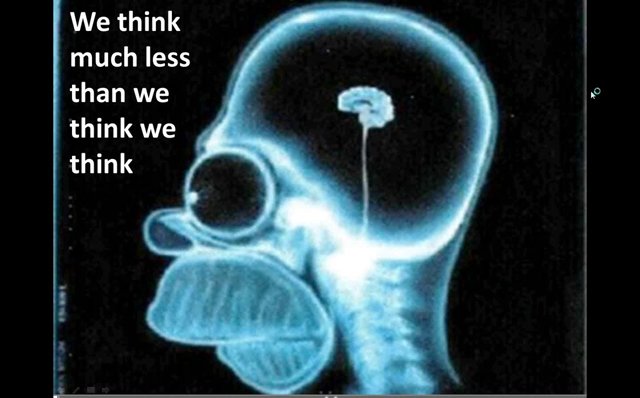The Cognitive Bias Challenge of Banking
Our innate human nature is to think fast, not slow and deeply. We are wired to deal with what’s right in front of us, rather than worrying too much about the future, logic and reason. To the buddha’s dismay we’re actually wired at a deep biological level to be present, being really concerned with the short term over the long term. For millions of years our primary concern was with getting to the end of the day. Cave man had no 30 year plan. He didn’t study logic, reason and philosophy. Medium and long term planning has begun to become a thing for many of us only very recently. For much of the planet there is still an overwhelming focus on the present. Research informs us that we have enormous amounts of difficulty relating to our future self, indeed having a third-person perspective of ourselves in the distant future, i.e. when presente with our future self we see us as someone else entirely. We overly discount future events, pain or pleasure. This is a very real challenge for banking especially those models such as investing and lending which are dependent on longer term thinking.

This difficulty in favouring the present moment over the future is acutely evident in addictions. When the smoker feels the surge of nicotine withdrawal arrive they deal with the immediate need, lighting up to quell the urge. They know that it’s gonna kill them, one cigarette at a time, but they also believe that death can be dealt with tomorrow, or the day after without having to go through the hell of giving up today. This is despite all of the government efforts. It ain’t pretty but today there are more smokers than ever before.
Such bias towards the short term is evident in financial health as well as physical health. A simple example is where we have a loan to pay off but choose to buy the $3 coffee everyday as a treat rather making a $0.30 coffee at work or at home. The maths is obvious: $3 every day is $15 a week or $60 a month. Triple that and a dent in $1000 debt can be made quite quickly. However the natural tendency is to value the short term pleasure of having the coffee now and to avoid thinking about the long term pain of cranking up the debt. We are naturally optimistic, “She’ll be right”.
Maths doesn’t help when it comes to human behaviour. People don’t need logic to change behaviour and start saving money for the future and forgoing immediate gratification, they need stimulus and conditioning. David Laibson, Professor of economics at of Harvard University suggests that the present-bias problem is one of the driving forces of excessive borrowing and engenders over-consumption.
As with many innovations, just making banking fun is unlikely to provide a silver bullet to the financial challenges at play.
